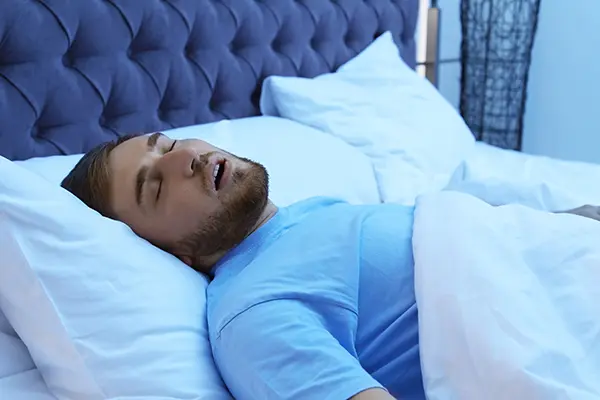Sleep Apnea Sleep apnea is a serious sleep disorder that causes someone to stop breathing while asleep. If left untreated, it can lead to daytime tiredness, loud snoring, and other severe health problems like high blood pressure, stroke, heart attacks, diabetes, and heart failure. It is good to note that sleep apnea is different from normal snoring, which is mainly caused by throat or nose conditions, poor sleeping style, alcohol use, older age, and being overweight. Sleep apnea can also cause job impairments and accidents such as motor vehicle crashes and work-related accidents in adults. In children, this condition can lead to poor performance in school. Visit Rolling Plains Dentistry for more information about sleep apnea. Sleep apnea is a serious sleep disorder that causes someone to stop breathing while asleep. If left untreated, it can lead to daytime tiredness, loud snoring, and other severe health problems like high blood pressure, stroke, heart attacks, diabetes, and heart failure. It is good to note that sleep apnea is different from normal snoring, which is mainly caused by throat or nose conditions, poor sleeping style, alcohol use, older age, and being overweight. Sleep apnea can also cause job impairments and accidents such as motor vehicle crashes and work-related accidents in adults. In children, this condition can lead to poor performance in school. Visit Rolling Plains Dentistry for more information about sleep apnea.Types of Sleep ApneaSleep apnea falls under two categories: central and obstructive sleep apnea. In central sleep apnea, your airway never blocks. What usually happens is that your brain doesn't message your muscles to breathe due to respiratory control center issues. Central sleep apnea is mainly associated with central nervous system function, and it is common in people who suffer from lung disease, kidney failure, stroke, and other neuromuscular diseases. Obstructive sleep apnea occurs when your airways block partially or completely while asleep as the soft tissue in the back of your throat collapses. Your chest muscles and diaphragm work a little bit harder trying to open the airways. This affects oxygen flow to your vital organs, leading to unusual heart rhythms. Symptoms of Sleep ApneaYour bed partner is usually the one who recognizes the first signs of sleep apnea. Most of the affected people do not have any sleep complaints. The common symptoms of sleep apnea include excessive snoring, daytime fatigue or sleepiness, night sweats, frequent nighttime urination, headaches, sexual dysfunction, and mood disturbances. You may also experience restlessness during sleep coupled with frequent nighttime awakenings. Sore throat and dry mouth after waking up are also signs of sleep apnea. Some people might encounter cognitive impairment such as irritability, forgetfulness, or trouble concentrating. In addition, bedwetting and sluggishness are significant sleep apnea symptoms in children. Sleep Apnea DiagnosisIf a sleep specialist suspects that you are suffering from sleep apnea, they can order an overnight sleep study (polysomnogram) for you. A polysomnogram (PSG) is usually carried out in a sleep laboratory with the help of a skilled technologist. The doctor will record various body functions such as muscle activity, breathing patterns, heart rate, eye movements, brain activity, blood oxygen levels, and airflow as you sleep. Once the study is through, the technologist will grade your sleep apnea based on the findings. Sleep Apnea TreatmentThere are different treatments for sleep apnea depending on its severity. Conservative treatments are the most common types of treatment for sleep apnea. Your doctor will ask you to stop smoking, lose weight, or treat nasal allergies. You can use an oral appliance, a device that will ensure your throat is open. You can use a continuous positive airway pressure (CPAP) machine as it keeps your upper airways open to prevent snoring or apnea. If all of the available treatments don't work, your doctor can recommend surgery. Visit Rolling Plains Dentistry to get more information about sleep apnea treatment. Call us today at 940-663-5353 to book an appointment. |